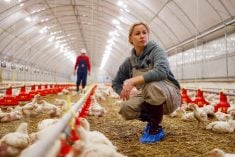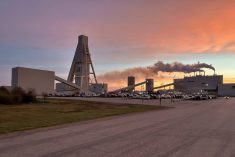CHICAGO, Sept 16 (Reuters) – Rains have slowed the start of the harvest in the western U.S. Corn Belt this week and wet conditions are likely to persist for the next several weeks, an agricultural meteorologist said on Friday.
Worries about harvest delays helped lift Chicago Board of Trade corn and soybean futures on Friday, traders said, with both commodities rallying from early declines.
“It’s led by the corn, thanks almost solely to the trade seeing a wetter harvest weather pattern next week than previously forecasted,” said Mike Zuzolo of Global Commodity Analytics.
Read Also

B.C. ostriches culled, CFIA confirms
Ostriches on an embattled Edgewood, B.C. farm have been culled after a prolonged legal battle, the Canadian Food Inspection Agency has confirmed.
Storms overnight dumped more rain than anticipated, including 1.25 to five centimetres in western Iowa, eastern Nebraska and southeast South Dakota. Local accumulations reached almos 18 cm in some areas, the Commodity Weather Group said.
“Those were some of the wetter areas to begin with, so that just sets them back farther,” said David Streit, a Commodity Weather Group meteorologist.
Activity in the Pacific Ocean should continue to fuel a wet pattern in the western Midwest for the next couple of weeks, Streit said, just as farmers are starting the harvest of what are expected to be record U.S. corn and soybean crops.
The corn harvest was one percent complete by Sunday in top producer Iowa and 18 percent complete in Missouri, both slightly behind the states’ respective five-year averages, the U.S. Department of Agriculture said early this week.
“The soils are struggling to get dried out enough to allow some of the early harvest progress get going. That is going to be an ongoing issue, particularly in the western Midwest,” Streit said.
“The only thing working on their side is temperatures tend to be warmer than normal, so we get a little better evaporation than we might get this time of year,” Streit said.
So far, he added, the rains have not been heavy or persistent enough to cause crop damage.














